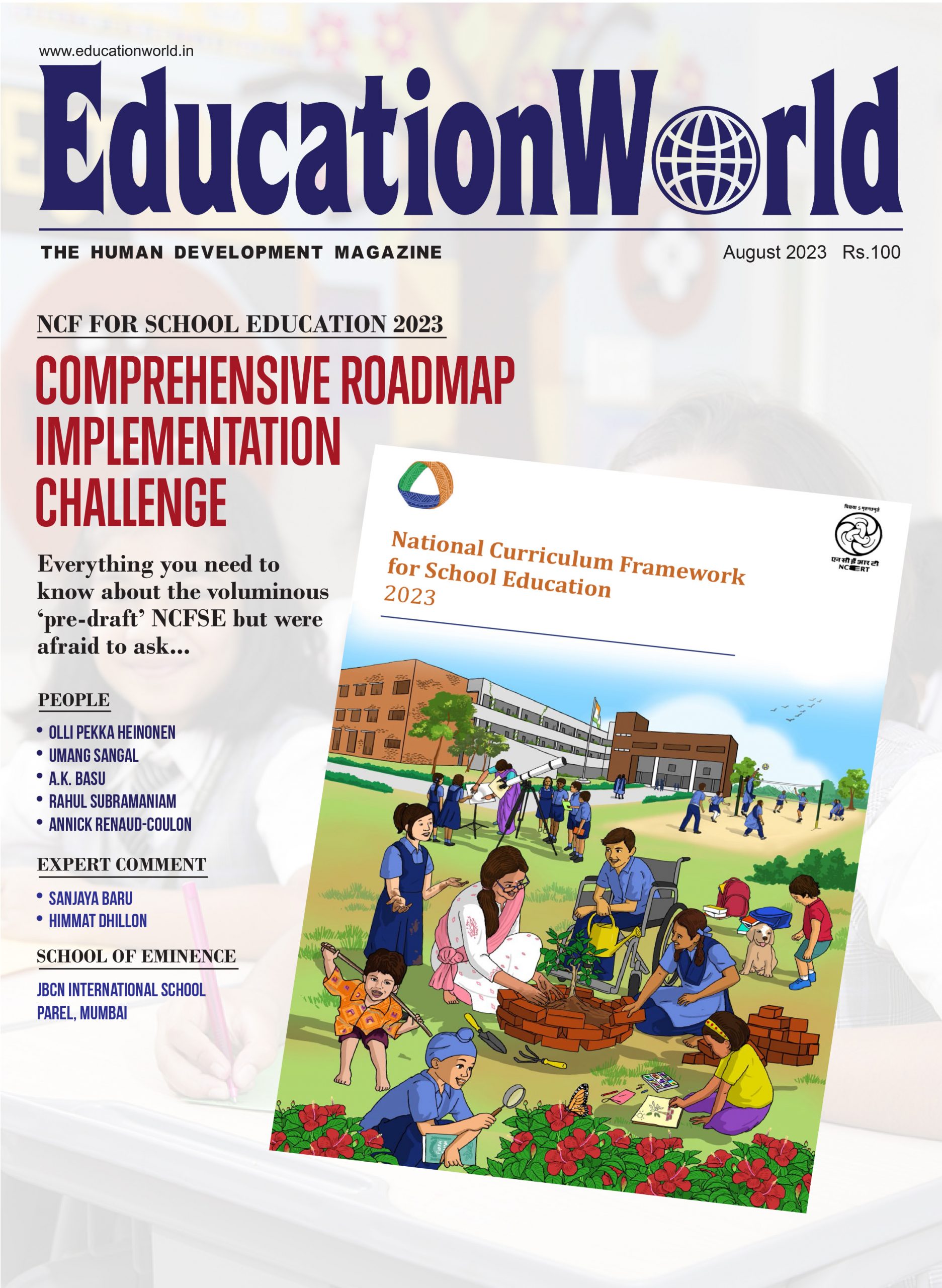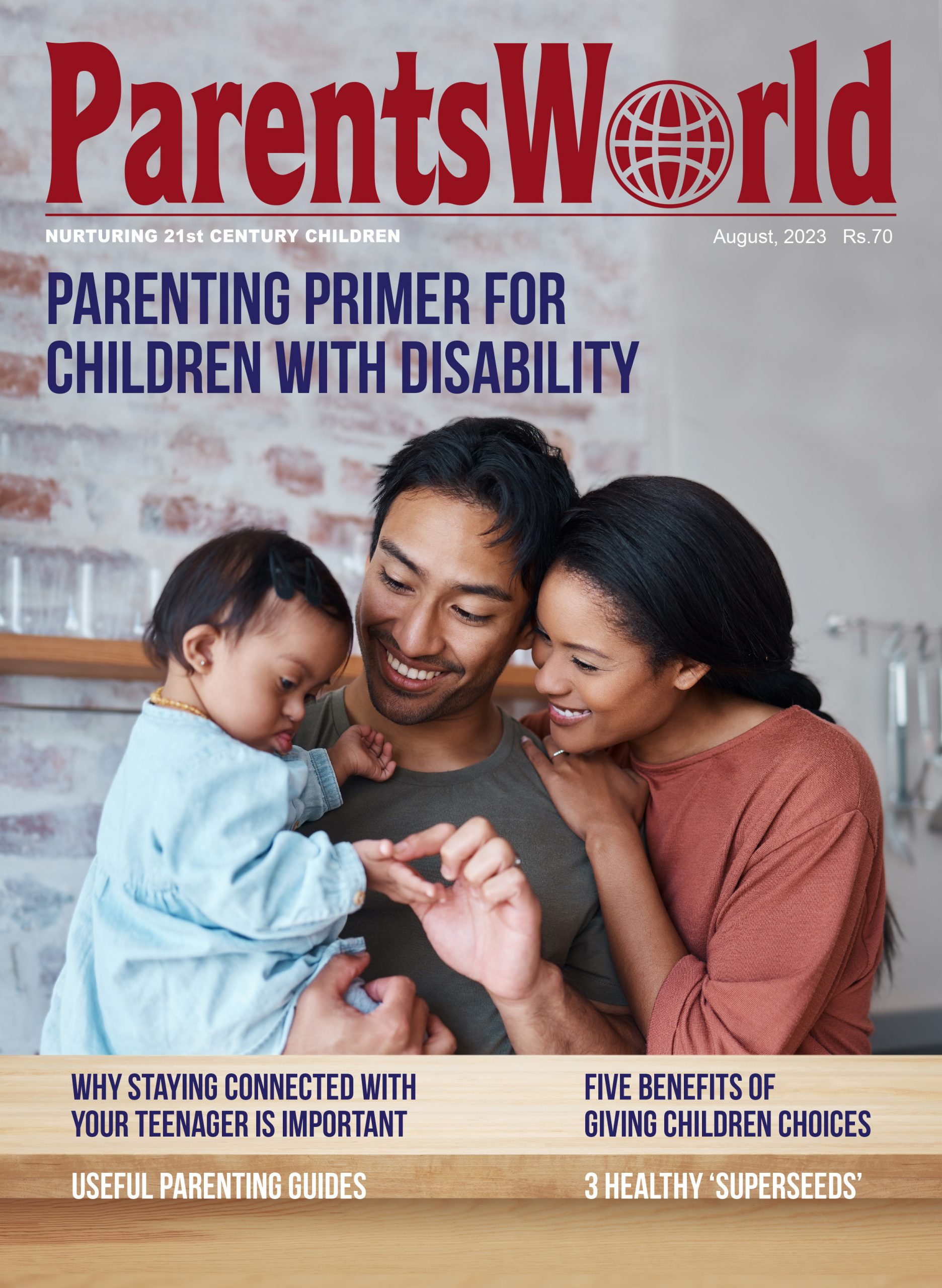NCFSE outlines ways and means to implement the National Education Policy (NEP) 2020 in the country’s 1.5 million primary-secondary schools. By the end of this calendar year, two additional NCF drafts, for teacher education (NCFTE) and adult education (NCFAE) are scheduled to be produced , writes Dilip Thakore & Summiya Yasmeen
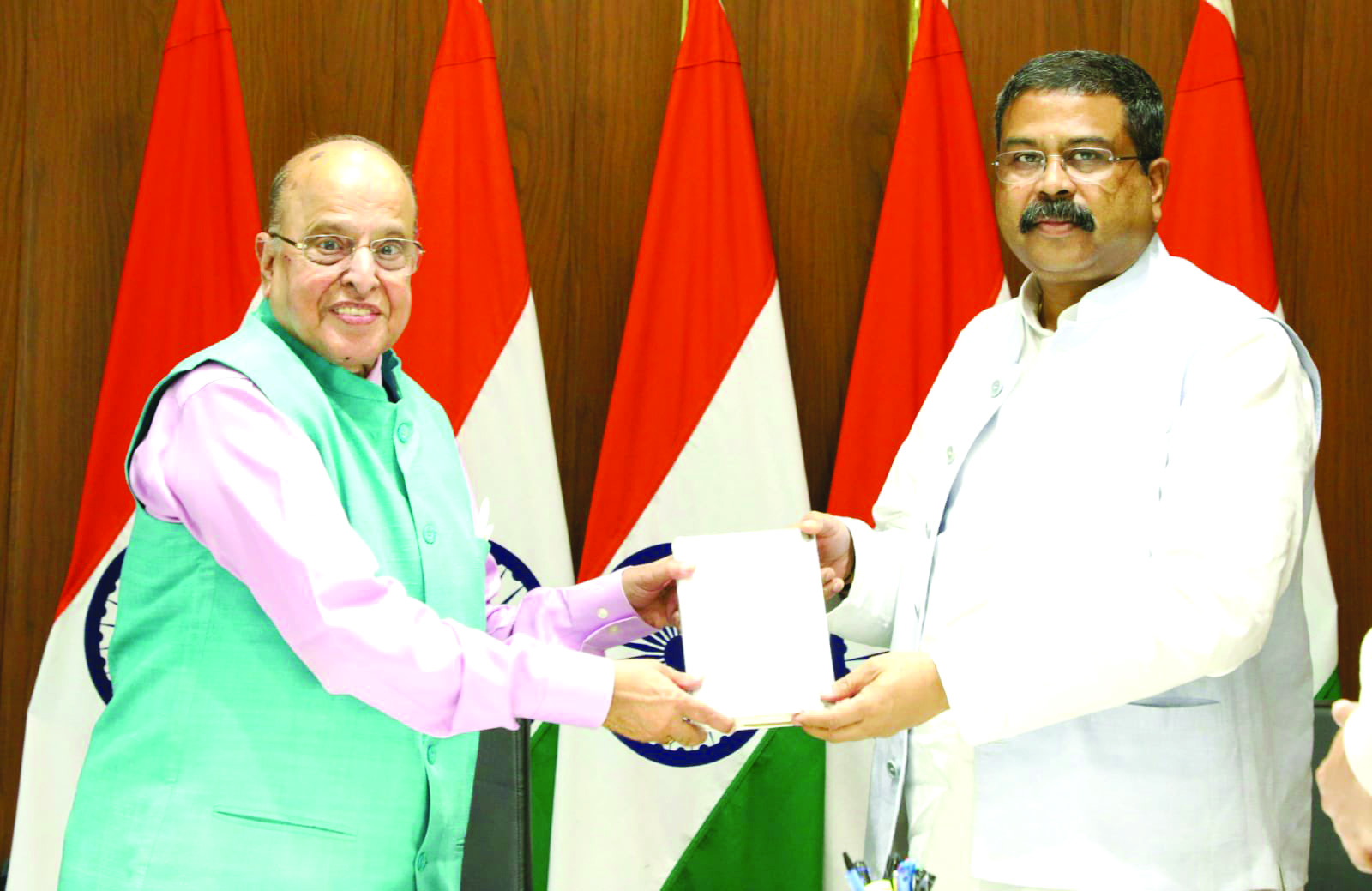
Dr. Kasturirangan (left) & Union education minister Dharmendra Pradhan releasing NCFSE 2023: feedback appeal
Following the launch of the 360-page National Curriculum Framework for Foundational Stage 2022 (NCF-FS) on October 20 last year for children in the 3-8 age group, a 684-page ‘pre-draft’ National Curriculum Framework for School Education (NCFSE) 2023 for children in the age group 8-18 was formally released in New Delhi by the Union education ministry on April 6. The merits of NCF-FS which was received with widespread acclaim were discussed in a previous issue of EducationWorld (see https://www.educationworld.in/ncffs-2022-promising-debut/).
NCFSE outlines ways and means to implement the National Education Policy (NEP) 2020 in the country’s 1.5 million primary-secondary schools. By the end of this calendar year, two additional NCF drafts, for teacher education (NCFTE) and adult education (NCFAE) are expected to be produced by the NCF Steering Committee chaired by former space scientist Dr. Krishnaswamy Kasturirangan. It’s pertinent to recall that Dr. Kasturirangan was also chairman of a nine-member committee of grey eminences from public universities which presented the BJP/NDA government at the Centre a 484-page draft National Education Policy in 2019, which was compressed into the 68-page National Education Policy (NEP) 2020.
Subsequently to ensure that NEP 2020, which proposes root-and-branch reform of India’s moribund education system from preschool to Ph D is implemented effectively, the indefatigable Dr. K’Rangan has also assumed the mantle of Chairman of the 13-member NCF Steering Committee. Quite obviously, the speed at which these voluminous curriculum drafts are being produced has taken its toll on the octogenarian Dr. Kasturirangan. In early July while in Sri Lanka, he suffered a minor heart attack and was flown to Bangalore by a special charter to the care of renowned cardiac surgeon Dr. Devi Shetty, who has advised rest and recuperation.
Naturally your editors who are neck-deep in education and supporters of his unprecedented effort to comprehensively reform India’s long-neglected education system sine qua non, are earnestly praying for his speedy recovery and assumption of leadership of the national education reform initiative. Therefore, we have spared him the burden of an interview to explain the purposes and modalities of NCFSE 2023.
Meanwhile, while formally releasing the ‘pre-draft’ NCFSE 2023, the education ministry’s statement emphasised that it was made public to solicit feedback “from various stakeholders, including students, parents, teachers, teacher educators, experts, scholars and professionals”. “While giving your feedback, it needs to be kept in view that this is a pre-draft of the NCFSE which still requires several rounds of discussion within the National Steering Committee (NSC). Feedback from diverse stakeholders will further help NSC to look critically into different modalities and approaches that this framework is proposing,” says the ministry’s statement. This EducationWorld feature is being presented to the ministry and public as feedback to NCFSE 2023.
Although the voluminous pre-draft NCFSE is bereft of the customary foreword and summary, its purpose is made clear in the introduction. “The overarching objective of this NCF(SE) is to help in positively transforming the school education system of India as envisioned in NEP 2020 through corresponding positive changes in the curriculum, including pedagogy,” says the introductory statement. And in anticipation of the initial shock reaction of most educators confronted with the voluminous 684-page NCFSE pre-draft, the intro makes clear that teachers are not obliged to read it in toto.
“This NCF aims to be understandable and relatable to, and usable by, practitioners of education, including teachers and other educators, school leaders, and functionaries of the education system such as project officers, cluster and block resource persons, block education officers, teacher educators, examination boards, and curriculum/syllabus/textbook development teams,” says the draft NCFSE prologue. In short, this voluminous policy is for teacher trainers rather than for teachers themselves. The primary message of NCFSE 2023 is that teachers need to be brought up to speed if NEP 2020 is to be implemented successfully because the “teacher is at the heart of the practice of education”.
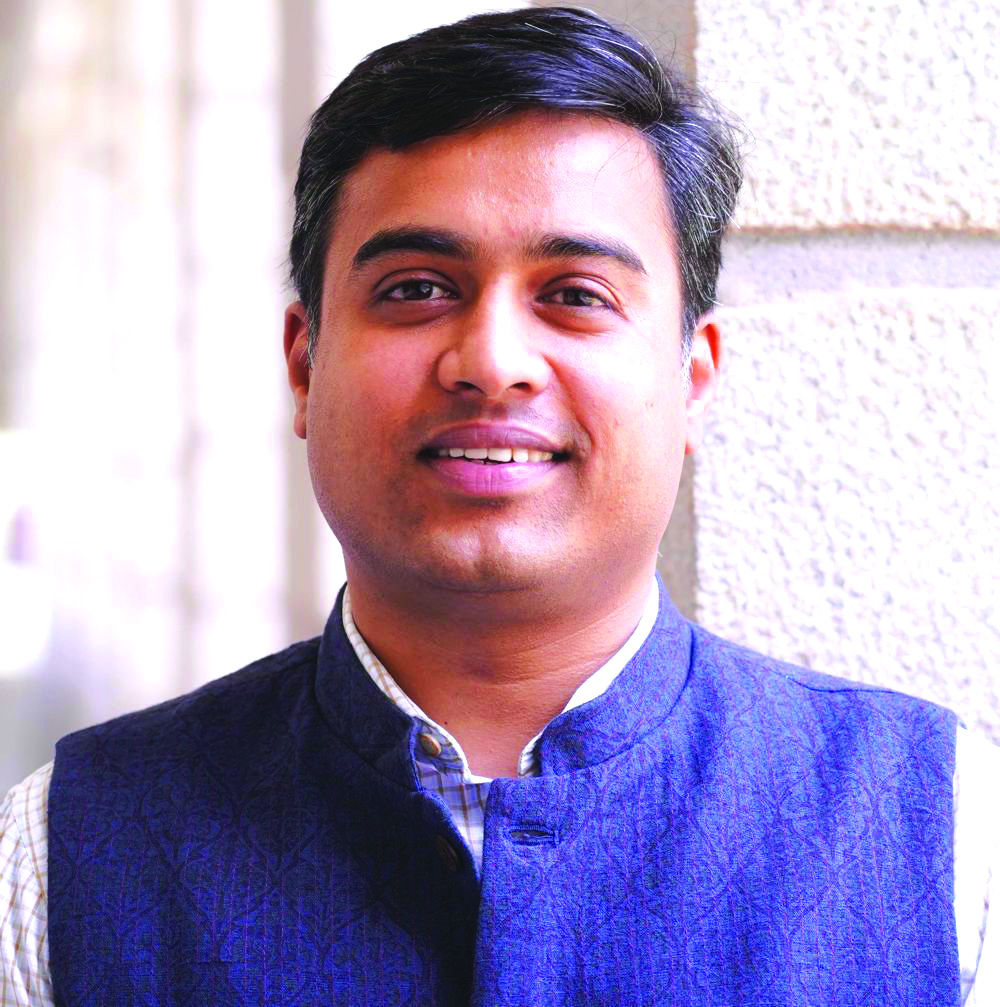
Singhai: numerous CGs & ILOs
That teacher trainers rather than teachers themselves are the prime targets of NCF-FS and NCFSE is confirmed by Dr. Chetan Singhai, the highly-qualified (JNU, NIAS, Institute of Education, UCL, London and National Law School of India University) Chief Consultant, Technical Secretariat of the Union education ministry, which is overseeing the entire NCF (early years, school, teacher and adult education) formulation process working in close consultation with Dr. Kasturirangan. “All four constituent drafts of NCF 2023 have to be viewed as a continuum primarily directed at teacher educators employed in 614 state-level DIETs (District Institutes of Education & Training) and six Regional Institutes of Education (RIEs). Working in close cooperation with NCERT (the apex-level Delhi-based National Council of Educational Research & Training), these are the nodal agencies which will discharge a major role in ensuring that the painstakingly formulated NCF 2023 meets its goal of implementing NEP 2020 and substantially raising teaching-learning standards in K-12 education,” says Singhai.
According to Singhai, the already completed NCF-FS and NCFSE drafts are formidably expansive because this time round, they include a large number of stage-by-stage curricular goals (CGs) and ILOs (illustrated learning outcomes) or examples and explanations for eight core subjects. “These CGs, and ILOs or illustrations which supplement bland copy and directives will make the job of teacher educators easier,” explains Singhai.
NCFSE 2023 is welcomed as a worthy successor to NCF-FS by Dr. Swati Popat Vats, the well-informed President of the Podar Jumbo Kids Education Network of 498 preschools spread across India. Last November, Dr. Popat Vats had enthusiastically welcomed the 360-page NCF for Foundational Stage released by the Union education ministry. With reference to NCF-FS she said: “The document is not just a vision but shows the pathway, the tools and the (teacher) training required to achieve the goals set by NEP 2020.”
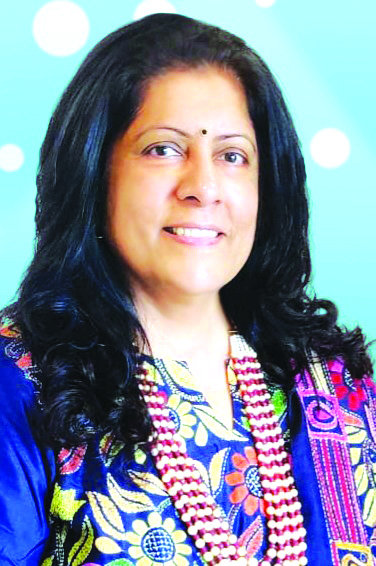
Dr. Popat-Vats: better educators guide
Dr. Popat Vats is similarly enthused by NCFSE 2023. “The new curriculum framework is truly national because it sets out in detail what teachers should ensure children across the country learn in eight curricular areas — languages, mathematics, sciences, social sciences, arts, physical and vocational education and interdisciplinary areas — regardless of the exam boards to which their schools are affiliated. This degree of detail was not provided in NCF 2005. Therefore, it is a better guide to teacher educators and teachers.
Moreover, it provides numerous examples and handholds teachers — including headmasters — to implement NEP 2020. NCFSE 2023 has provided government and private schools a clear roadmap for substantially raising teaching-learning standards in K-12 education,” says Dr. Popat Vats.
Although she welcomes the highly detailed new NCF-FS and NCFSE with their large number of illustrations, aka examples, which makes the job of teacher educators easier, Maya Menon, an alumna of Delhi and Leicester (UK) universities and highly committed Founder-Trustee of the Bangalore-based The Teacher Foundation (estb.2002) which during the past 21 years has trained 93,000 teachers, is apprehensive about last mile delivery.
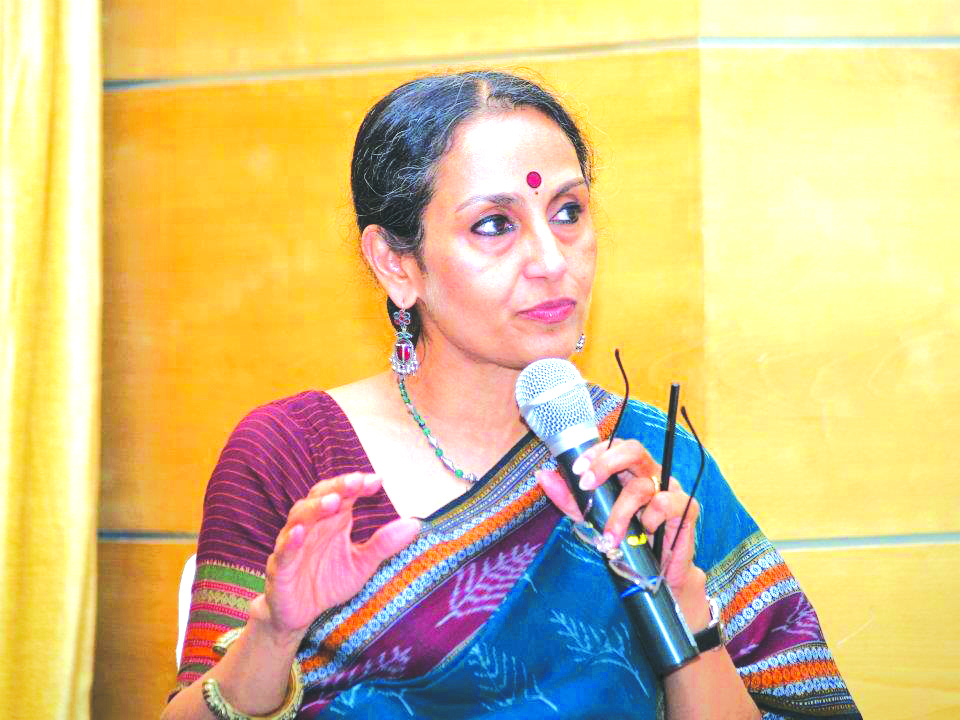
Menon: implementation scepticism
“NCF 2005 which accorded high importance to connect children’s learning to their lived experience outside classrooms, discouraged rote learning and accorded great importance to sports and vocational education, was also an excellent document put together by 21 focus groups of eminent educationists. However, it made very little impact on government school teachers who were its prime targets. State-level DIETs made half-hearted efforts to include its recommendations into their teacher training programmes. This time round, the four tomes — foundational, school, teacher and adult education manuals — formulated by the Steering Committee offer numerous clear goals and illustrations to translate objectives into step-by-step teacher development programmes. But I am skeptical about the capability of teacher educators in DIETs to translate them into inspiring teacher development programmes. The main reason why learning outcomes have remained stagnant, especially in government schools, is because teachers are disempowered and demotivated. They are not involved in the policy formulation process nor are they involved in implementing NEP and NCF at the taluk level, or even in drawing up school plans. Greater involvement of teachers’ representatives in the Steering Committee or at least in drawing up district-level implementation programmes and school plans is necessary to encourage them to assume responsibility and improve learning outcomes,” says Menon.
Undoubtedly, there is substance in Menon’s assertion that India’s 975,000 K-12 teachers — especially in 1.1 million government schools countrywide — are demotivated despite their relatively higher Pay Commission-linked remuneration, a stimulus denied to the great majority of private school teachers. In the country’s estimated 400,000 budget private schools in which students’ tuition fees vary between Rs.500-1,000 per month, teachers’ remuneration is often 20-25 percent of the payout to government school teachers. However, the downside of government schools service is that teachers are obliged to serve in ill-maintained institutions lacking essential facilities of toilets, safe drinking water, electricity, libraries and laboratories. Moreover, they are subject to arbitrary transfer and extortion demands of education ministry officials.
Little wonder that 25 percent of government school teachers are absent every day and multi-grade teaching is the norm. Therefore, chances are that the detailed NCF four-volumes being formulated by the 13-member Steering Committee may flounder at the last mile implementation stage amounting to love’s labour lost.
NCF-FS and NCFSE drafts are formidably expansive because this time round, they include a large number of stage-by-stage curricular goals & illustrated learning outcomes
If there are last mile implementation hurdles to NCFSE as Menon and other independent monitors of Indian school education apprehend, it will be a tragedy. Because the most commendable features of NCF-FS and NCFSE 2023 are the step-by-step curriculum achievement goals and illustrative learning outcomes of students at every stage — foundational, preparatory, middle and secondary. Moreover, NCFSE provides revised rationales and definitions for language learning, maths, science, social sciences and presents curricular goals to be attained at various stages in addition to ways and means to periodically assess learning outcomes.
In short, NCF-FS and NCFSE are comprehensive teachers’ manuals that can enable realisation of the goals set out by NEP 2020. The large number of CGs (curricular goals) and ILOs (illustrative learning outcomes) set out for eight core subjects and classes XI and XII, explain the prolixity of NCF-FS and NCFSE 2023 (360 and 684 pages) cf. the single volume NCF 2005 (159 pages).
Moreover while NCFSE is certain to prove very valuable to teacher educators including DIETs, RIEs and to colleges and universities which offer the B.Ed programme, it is also certain to prove valuable to school principals and headmasters who can not only arrange for teacher development workshops but also keep track of students’ learning attainments by formally or informally testing whether they have attained the ILOs sign-posted in NCFSE 2023.
“Within the Indian school system, the role of principals has been mainly administrative and restricted to ensuring that overall scores in school-leaving board exams are respectable. Now with NCFSE setting detailed CGs and prescribing ILOs for every stage in the teaching-learning process, principals will be able to separate the wheat from the chaff among their teachers through formal or informal testing of students. In government schools where principals rise to the top on the basis of seniority and/or political connections, this option may not be exercised. However in private schools, teacher performance can be continuously monitored. If NCFSE is properly utilised, principals can become more involved with curriculum implementation. This is a beneficial development,” says an experienced education consultant, who preferred to remain anonymous.
Although forbidding ab initio, NCFSE (and NCF-FS) are in effect excellent teacher manuals which if followed in letter and spirit can achieve the goals of real learning by comprehension as recommended by NEP 2020, rather than rote learning, the bane of India’s K-12 education system. The 13-strong NCF Steering Committee has done a good job of providing a roadmap to implement the widely welcomed NEP 2020. Unlikely to rest on their laurels despite the setback to chairman Dr. Kasturirangan’s health, the committee is working at fast pace to produce drafts of NCF for teacher education and NCF for adult education.
A common factor for the successful implementation of NCF-FS, NCFSE and the imminent NCFTE and NCFAE is larger budgetary allocations. Therefore, government expenditure (Centre plus states) for public education must forthwith be raised to 6 percent of GDP. NEP 2020 prescribes that the Centre and states allocate 10 percent of annual expenditure for education within ten years. Pending that, annual outlay for education must rise to 6 percent of GDP from next year. A calculus to attain this objective has repeatedly been provided by EducationWorld (see March 2023).
The lay public, educationists and the educators’ community in particular need to respond with constructive suggestions and recommendations (as we do in the pages following) to ensure that post-independence India’s obsolete K-12 education system which has thus far failed to provide a strong foundation for tertiary and postgrad learning, is brought on a par with the best worldwide. This is a necessary precondition of harvesting the country’s demographic dividend and transforming 21st century India into a middle class nation.
NCF for school education 2023
What children should learn

Secondary school children in Mumbai: valuable learning attainment signposts
The ‘pre-draft’ National Curriculum Framework for Foundational Stage (NCF-FS) and National Curriculum Framework for School Education (NCFSE) prepared by a 13-member Steering Committee chaired by former ISRO (Indian Space Research Organisation) scientist Dr. Krishnaswamy Kasturirangan are voluminous documents, likely to intimidate teacher educators and teachers’ communities for whose benefit they have been prepared. The NCF-FS draft comprises 360 pages and NCFSE 628 pages.
However, this sentiment is unwarranted because the prolixity of the two drafts is due to the unprecedented guidance and handholding provided by the steering and several other sub-committees to teachers — and self-driven students. Therefore these constituencies shouldn’t be put off by the voluminous size of the ‘pre-drafts’ which have invited amendments and comments prior to finalisation. This EducationWorld cover feature is a response to this invitation with the additional benefit that it also summarises and highlights the main features of NCFSE after having whole-heartedly welcomed NCF-FS in a previous issue (see https://www.educationworld.in/ncffs-2022-promising-debut/).
The highlight of NCFSE — and a major service to teacher-educators, teachers, parents and students — is that it details ways and means to teach, monitor and assess eight major schooling subjects/areas — language education, maths, science, social science, arts education, interdisciplinary linkages, physical and vocational education — for children in primary-secondary education.
In each of these subjects, the draft defines objectives, learning attainment sign-posts (curriculum goals) and provides illustrative outcomes of what students should have learned in each class in middle (classes VII-IX ) and senior school (X-XII) in eight core subjects. For teachers, this is a valuable guide as it enables them to measure their progress in implementing the curriculum at every stage.
For instance to teach science to students in middle stage, in a chapter titled Learning Standards (section 4.4) the draft NCFSE 2023 sets out seven curricular goals (CGs) starting with CG-1 in which students should “explore the world of matter and its constituents, properties and behaviour”, learn to classify matter (solid, liquid, gas etc), learn the properties of matter and how they can be changed; measurement of matter, the impact pressure, temperature and density.
CG-2 mandates that children should “explore the world around them in scientific and mathematical terms”. Similarly, CG 3 sets out learning milestones which will enable teachers (and parents) to track the progress of students. This is followed up by ILOs (illustrative learning outcomes) which further enable teachers to measure how much students have learned.
xLikewise to teach science in secondary stage, by monitoring the progress in the attainment of 7 CGs beginning with students in class IX exploring “the world of matter, its interactions and properties at the atomic levels” to exploring the nature of science by doing science, children should have a grasp of scientific theories and principles and be able to communicate using scientific terminology. Again the seven CGs are complemented by ILOs which test the competency levels attained by students.
The chapter on Learning Standards is followed up by a chapter titled Rationale for Content Selection (4.5), Pedagogy (4.6) including Recommended Pedagogical Approaches and Settings (4.6.1.1), Classroom Management (4.6.3) and Assessment in Science (4.6.3) with several ILOs in all chapters/sections.
Given the depth of detail and numerous ILOs and examples, quite obviously the Steering Committee which has formulated NCFSE 2023 had teacher educators who run programmes for teachers in the country’s 1.10 million government schools, foremost in mind. Relatively less accountable and the great majority of them recruited on considerations other than merit, teachers in government schools — especially state government schools which constitute 90 percent of government schools countrywide — need training. Although NCFSE 2023 also serves as a good roadmap for the country’s 400,000 budget private schools (BPS) where teaching-learning standards are slightly better, this elaborate document if followed in letter and spirit will undoubtedly improve learning outcomes in government and budget private schools.
Moreover apart from chapters on teaching the eight core subjects/areas in a systematic way with continuous monitoring and testing, NCFSE contains several other useful chapters.
Among them Part C: Cross-cutting Themes (values, inclusion, guidance and counselling, environment and rootedness in India); Part D (School Culture and Processes) and Part E (ensuring an appropriate environment for learning (teacher-pupil ratio, enabling and empowering teachers, and role of academic and administrative functionaries)). And as NCFSE repeatedly stresses, all its recommendations for curriculum development and delivery are purposed to enable smooth implementation of the National Education Policy (NEP) 2020.
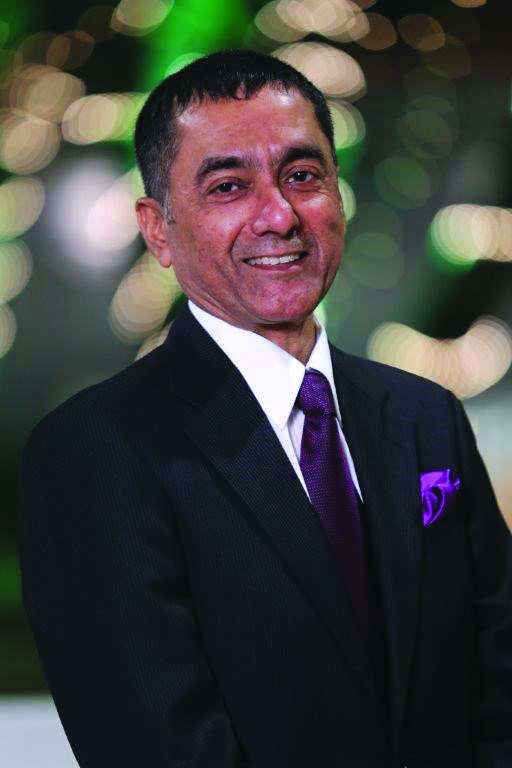
Kaushik: implementation conundrum
It’s also noteworthy that the learned and bona fide authors of NCF-FS and NCFSE repeatedly stress these documents are ‘pre-drafts’ subject to correction and improvement on the basis of feedback received from the public. Therefore, educationists, educators and others who have ideas and solutions to improve teaching-learning standards in K-12 education should avail this opportunity to send their recommendations to the Steering Committee through the Union ministry of education.
Expert comment. “NCF-FS and NCFSE are well-researched and well-written overarching policy documents. Essentially they are for state governments to contextualise within the frameworks provided. Yet the devil is in implementation. If they are implemented 70-80 percent, it will be a great leap forward for Indian K-12 education. They provide very useful curricular goals and illustrative learning outcomes for teachers — perhaps parents — to monitor the progress of children along the school education continuum. However, teachers need to be cautious about curricular goals because all children don’t learn in the same way and same speed,” says Amit Kaushik, an economics postgrad of Punjab University with work experience in the Union education ministry (2001-06), and currently CEO (India) of the Australian Council for Educational Research (ACER), an independent Melbourne-based not-for-profit mandated to improve learning globally.
EW comment
• Don’t be put off by the voluminous size of NCFSE. It is a well sign-posted teachers’ guide to implement the curricula prescribed by exam boards in eight core subjects as also in classes XI and XII. From the index, it is easy to navigate your way to the section required at a particular time.
• NCFSE is a roadmap for teachers to implement the goals and objectives set out in the National Education Policy 2020. The policy recommends joyous learning through comprehension rather than memorisation and rote. Therefore, the guidelines and provisions of NCFSE should be implemented through experiential learning in which teachers and students learn together.
• NEP 2020 encourages revival of India’s ancient pedagogy of peer-to-peer learning. This should be encouraged by teachers following NCFSE through students learning one-on-one or in clusters.
• NCFSE recommends continuous testing by setting curricular goals and illustrative learning goals. These are important recommendations that teachers should heed.
• NCFSE reiterates that “teachers are at the heart of the practice of teaching”. Therefore to realise the goals of NEP 2020, teachers need to acknowledge the critical importance of their role in the national development effort. In particular, relatively well-remunerated government school teachers need to improve their attendance records and take responsibility for children’s learning outcomes.
• State governments who fund the majority of the country’s 1.2 million government schools need to tighten up their administration of these schools — fill vacancies, ensure full teacher attendance, eliminate multi-grade teaching and provide enabling infrastructure to transform government schools into inviting institutions which children look forward to attending.
A highlight of NCFSE is that it details ways and means to teach, monitor and assess languages, maths, science, social science, arts, physical and vocational education
NCF for school education 2023
Guidelines for teachers
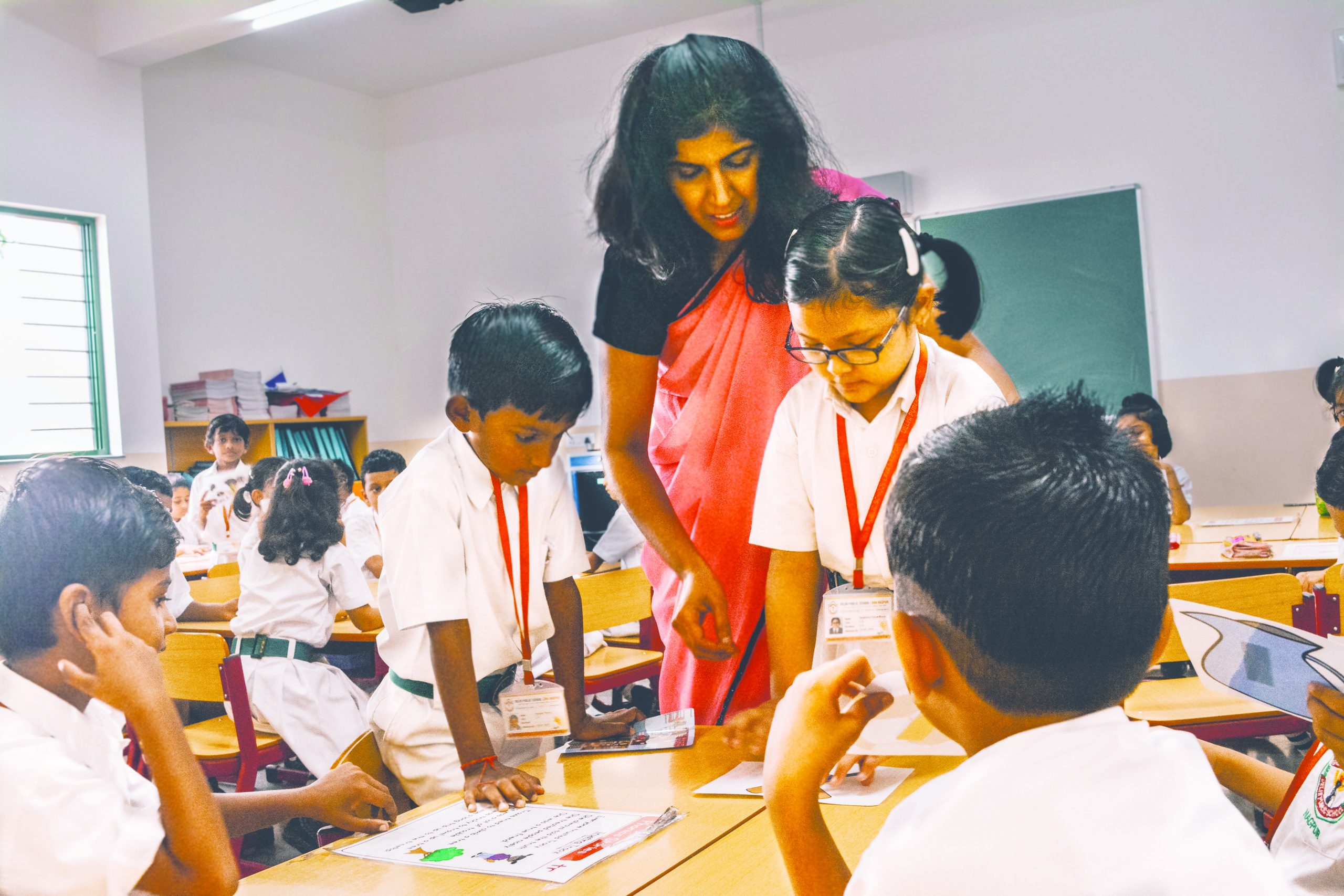
Teacher in Nagpur classroom: new pedagogies plea
Eighteen years ago when the National Curriculum Framework 2005 was published by the then UPA-I government, one of its main thrusts was to ensure that “learning is shifted away from rote methods”. Fast forward to 2023 and NCFSE released to the public for feedback by the BJP/NDA government in April, promulgates the same objective — to “move away from an overemphasis on memorisation and content accumulation”. Though the two documents are 18 years apart, NCFSE’s renewed push to move away from rote learning is acknowledgement that teaching-learning in the majority of the country’s 1.5 million schools is still mired in traditional rote learning pedagogies.
Therefore, this time round the draft NCFSE 2023 explicitly recommends shift to experiential activity, inquiry-based pedagogies to develop children’s creativity, critical thinking, and problem-solving skills in eight core subjects and also classes XI and XII. “Effective pedagogy encourages conceptual understanding, active discovery, and independent learning, gives serious consideration to student experiences and student voices, acknowledges and accommodates student diversity, builds on students’ previous knowledge, uses a range of teaching techniques, and gives timely feedback on work done,” intones NCFSE 2023.
In Chapter 3 Section 3.3 titled ‘Pedagogy’, detailed guidelines are set out on child development, effective pedagogy for achieving the aims of school education, teacher planning, managing classroom/student behaviour and pedagogy to be used in the new 5+3+3+4 system. In addition, detailed pedagogy strategies are listed for all 10 curricular areas/subjects. For instance for maths education, NCFSE 2023 recommends using play-way (activity-based), discovery-inquiry, problem-solving, inductive and deductive teaching.
Moreover to enable the objective of making the NCFSE “as relatable to practitioners as possible”, eight volumes will follow, of which seven will be on the specific curricular areas — arts and music, languages, math, science, social science and humanities, sports, and vocational education, and one on school culture and processes. These volumes promise “greater details” to practitioners including curriculum and textbook developers, teachers and assessors to enable realisation of NEP 2020 goals. Altogether, NCFSE 2023 will comprise ten volumes.
Given below are the highlights of Section 3.3 on pedagogy which details “pedagogical considerations for physical development, emotional development, social and ethical development and cognitive development of children”.
Foundational Stage
• Pedagogic strategies for early childhood education must ensure literacy and numeracy learning
• Teachers should encourage learning through play including conversations, stories, toys, music and art
• Indoor games including strategy, logic, board and word puzzles should be used to develop children’s logical and critical thinking skills. Also outdoor games
• Teaching-learning outdoors in nature, and field trips should be utilised
• Teachers should use multi-modal teaching-learning materials including toys for numeracy, children’s books, picture and activity books, worksheets, audio-visual materials, etc.
Preparatory Stage
• Teachers should move to pedagogies which stimulate children’s thinking and analytical skills and encourage independent learning
• Teachers should use multimodal teaching-learning materials, plan for field visits, apportion sufficient time outdoors, encourage children to demonstrate logic in their reasoning, and prompt thoughtful questioning in the classroom
• Moreover, children should be encouraged to refer to books and periodicals for research
Middle & Secondary Stages
• Teachers need to enable students to shift from practical to theoretical concepts across curricular areas
• Rules for technology and media usage become necessary. Teachers should demonstrate discerning educational use of the internet and media devices. Also initiate conversations about cyber safety
• Teachers should set problem-solving tasks that encourage students to reason, communicate, represent, and connect, as well as justify their thinking
• Introduce small group work to enable peer learning. Group work may include problem solving, group discussion and reasoning, etc.
• Encourage oral presentations, debates, public speaking, group discussions, role play, peer and collaborative learning.
• Teachers should encourage hands-on learning activities, demonstrations, and project-based learning
Non-negotiable principles of pedagogy
• Teachers should not use punishment and fear in classrooms
• Inequity and discrimination on the basis of caste, gender, religion, socio-economic conditions, learning outcomes or any other factor is taboo
• Teachers should not use rote memorisation as the primary form of learning or assessment
• Students must not be treated as passive receivers of information
Expert comment. “Like the previous NCF 2005, the new NCFSE 2023 is an excellent, aspirational document. The challenge is to implement it in the nation’s classrooms. Government, education ministry and policy makers should invest time in understanding and analysing the reasons why NCF 2005 was not actioned in schools across the country, and learn from the experience.
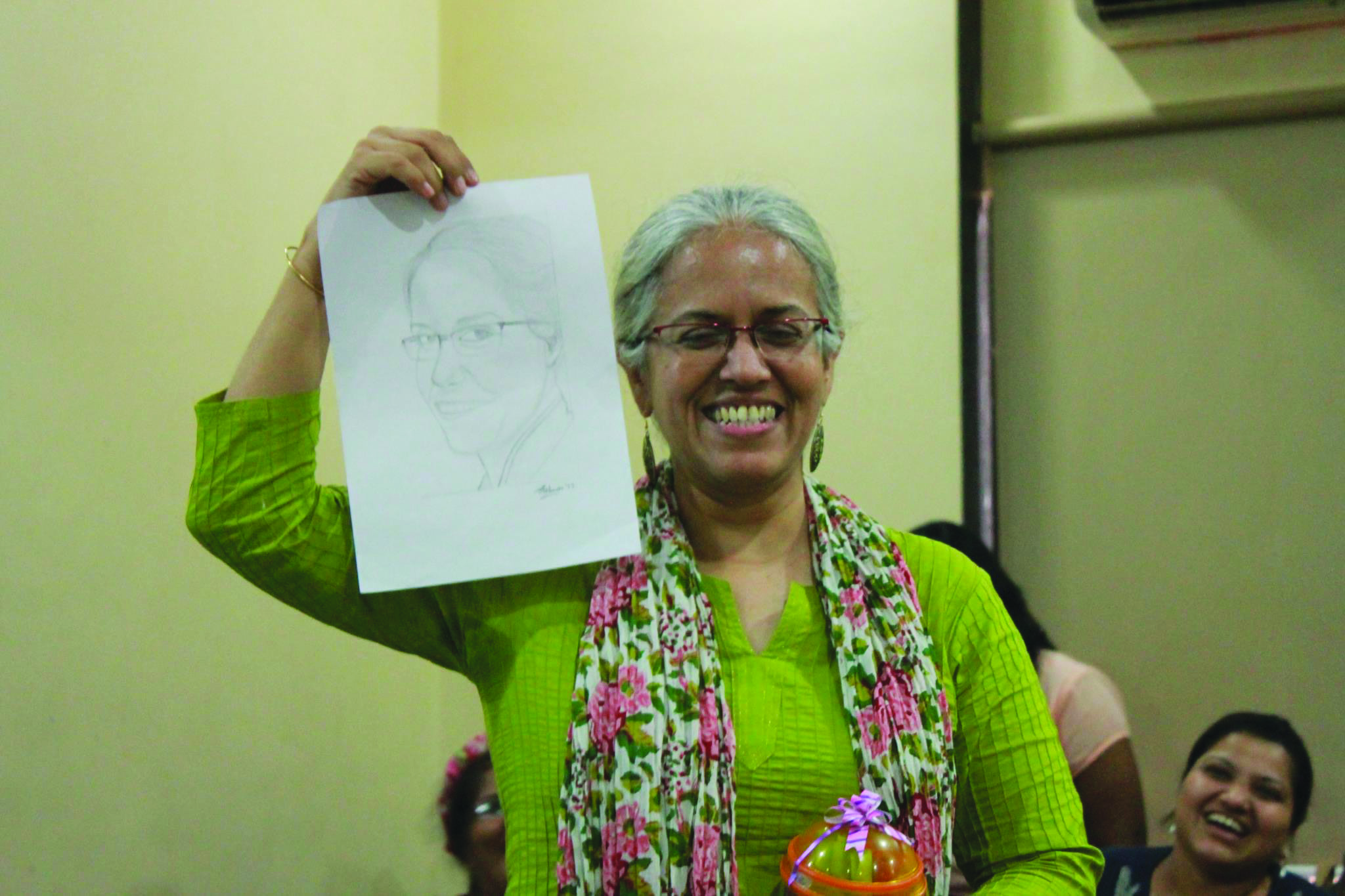
Kavita Anand: delivery roadmap omission
Undoubtedly the draft NCFSE 2023 contains several excellent recommendations on pedagogy, but it is silent on the roadmap to delivering them in classrooms. There is no point in merely changing textbooks and curriculums; the real change will happen when teachers are trained and supported to implement new pedagogies with the cooperation of parents and students. We need to develop robust supportive systems to empower teachers to implement NCFSE 2023,” says Kavita Anand, founder-director of Adhyayan Quality Education Services Ltd (estb.2011), a Mumbai-based consultancy that has aided and advised over 400 schools countrywide to improve leadership, professional development and institutional governance.
Anand suggests that the first step in effective implementation of NCFSE 2023 is for SCERTs, DIETs, RIEs, and Directorates of Education in the states to set up ‘Study Circles’ to thoroughly study and absorb the framework and its recommendations. “They need to own it and fully understand and appreciate the framework and then devise ways and means for school leaders and teachers to implement it. The transition from rote to inquiry-based pedagogies will take time and requires well-conceptualised management systems for them to be implemented,” she adds.
EW comment
• The shift from chalk-n-talk to inquiry-based, experiential pedagogies is overdue. The country’s 10 million teachers need to break away from memorisation pedagogies to equip children with 21st century thinking and problem-solving skills.
• Intensive and continuous teacher training will be required to implement NCFSE recommended pedagogies.
• There is inadequate emphasis on teachers using new digital technologies in the classroom. The final draft should stress that teachers use technology to make teaching-learning engaging and meaningful.
• Commendably, the NCFSE 2023 recommends that teachers “value and respect all students, get to know students individually,” listen and observe them carefully and build positive teacher-student relationships. This requires more positive teacher-pupil ratios.
• Again, the emphasis on remedial teaching and differentiated instruction requires improved teacher-pupil ratios.
• NCFSE’s direction to teachers to use varied resources and not overly depend on textbooks is important. Given the predisposition of political parties to rewrite textbooks to reflect their ideological biases, it’s critical for teachers to use textbooks as only one among several resources to achieve curricular objectives.
• Care should be taken that the pedagogical ‘strategies’ and ‘considerations’ prescribed don’t dilute teacher autonomy and flexibility to innovate teaching-learning.
• The framework fails to provide a roadmap as to how the country’s 10 million teachers will be equipped with the skill-sets to implement NCFSE 2023.
• Assessment formats and the exam system need a complete overhaul if teachers are to teach students to learn differently. Therefore, it’s imperative that the national and state examination boards switch from rewarding memorisation skills and assess students’ critical thinking and problem-solving capabilities.
NCF for school education 2023
Assessment & testing guidelines
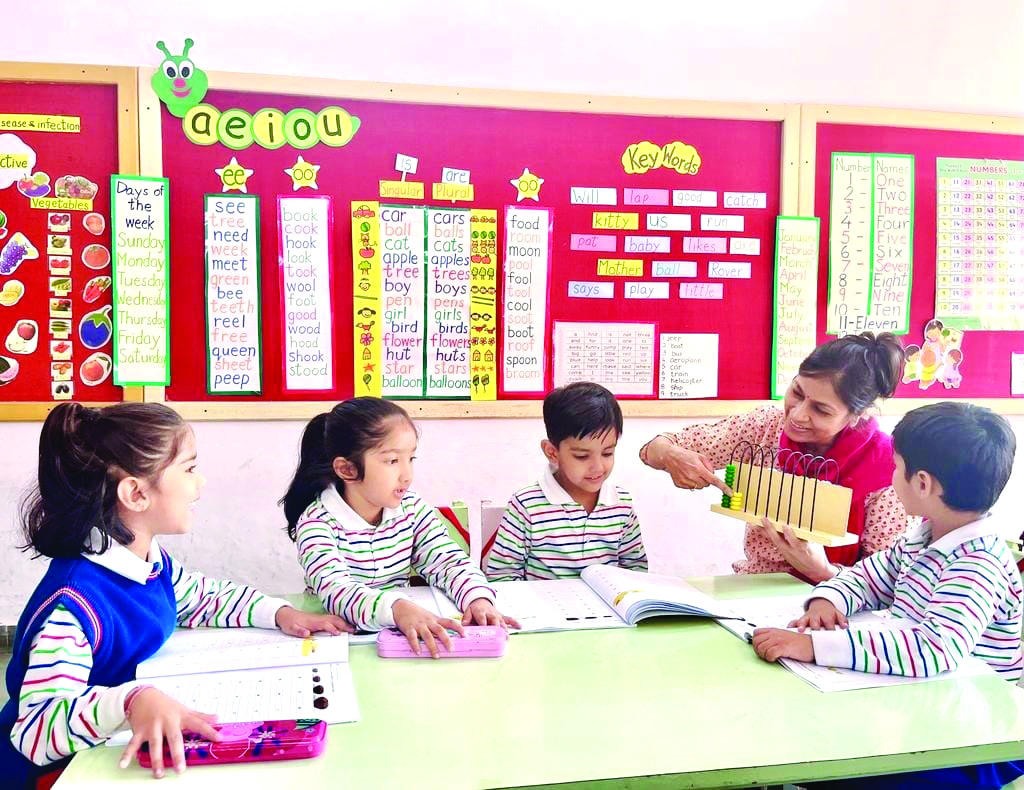
Foundational stage children: tests and exams prohibition
The learning assessment mandates of the National Curriculum Framework for School Education (NCFSE) 2023 are well-aligned with the objectives of NEP 2020. NEP 2020 unambiguously calls for a shift from “summative assessment that encourages today’s coaching culture to formative assessment”, “continuous review of progress” and reform of board/entrance examinations.
Consequently, NCFSE 2023 recommends that the new assessment system “shifts from one that is summative and primarily tests rote memorisation skills to one that is more regular and formative, is more competency-based, promotes learning and development for our students, and tests higher-order skills, such as analysis, critical thinking, and conceptual clarity”.
In Chapter 3, Section 3.4 (pages 83-89), NCFSE 2023 details the aims and objectives of learning assessment under the new 5+3+3+4 curricular and pedagogical structure of school education ordered by NEP 2020.
Foundational stage
(Preschool-class II)
Though a separate and distinct National Curriculum Framework for Foundational Stage (NCF-FS) 2022 details at great length (360 pages) the curriculum, pedagogy and assessment of early childhood education, NCFSE 2023 also includes assessment guidelines for early childhood education. Summarising NCF-FS released last October, it says:
• Explicit tests and examinations are completely inappropriate for this stage.
• Assessment should allow for diversity among children and their learning speed. Teachers should design different types of assessment processes and use each process appropriately.
• Assessment should enable recording and documentation. Teachers should describe and analyse children’s progress through systematic collection of evidence.
• Two appropriate assessment methods which teachers are advised to use are observation of the child and analysing art works that she has produced as part of her learning experience.
Preparatory stage
(Class III-V)
• With the start of more formal learning, teachers should design a robust system of formative assessment to track the progress of children.
• Children learn better when they are aware of the competencies to be attained. Teachers should make them understand the desired competency to be achieved periodically.
• Written tests can be introduced at this stage.
• Teachers should prepare portfolios to capture children’s progress holistically.
• Peer and self-assessment should also be introduced to help children monitor the trajectory of their own learning.
• At the end of this stage, teachers should prepare a comprehensive summative assessment of the student’s readiness to enter middle school.
Middle school
(Classes VI-VIII)
• With the increase of curriculum load in every subject, assessment should continue to test learning outcomes in all subjects including co-curricular.
• With the focus of the curriculum moving to conceptual understanding and higher order thinking, teachers should introduce pupils to learning through projects, debates, presentations, experiments, investigations, role play, journals and compile portfolios to assess learning.
• Teachers should use regular summative assessments at this stage to enable students to synthesise their learning at logical intervals (e.g, year-end, term-end, unit of learning-end). Summative assessments comprising multiple-choice questions and constructed responses (e.g, short answer, long answer) may also be used periodically.
• By the end of middle school, teachers should prepare a comprehensive summative assessment of every student’s achievement of competencies in each curricular area. The assessments should also indicate special interest or inclination in specific co-curricular areas that students have demonstrated.

Secondary school children: self-assessment plays a key role
Secondary school
(Class IX-XII)
• Teachers should conduct regular summative assessments for recording students learning competencies.
• Regular classroom assessments, as in middle school, are critical at this stage.
• Self-assessment plays a key role in student learning at this stage. Teachers should assist students to monitor what they are learning and use feedback to adjust, adapt, and decide their own strategies for teaching.
• Teachers should design summative assessments using case-based questions, simulations, and essay-type questions to enable assessment of competencies.
• At this curricular stage, students should also be prepared to write board examinations and other selection tests to access higher education and livelihood opportunities.
Board examinations (class X and XII)
The draft NCFSE 2023 proposes an overhaul of the school-leaving exams system. Major recommendations include:
• Board examinations should be designed to assess secondary stage competencies as prescribed in the curriculum.
• Exam boards should design and implement fair, reliable and valid testing processes, and instruments to test achievement of articulated competencies and certify students. As stated in NEP 2020, exam boards should have no role in the design of the curriculum or the prescription of competencies. This is the responsibility of the appropriate academic authority (e.g, NCERT or SCERT).
• Board examinations should be offered at least twice a year to ensure that students have enough time and opportunity to perform well. This process could be made possible through the creation of a comprehensive test questions bank which can be used to design tests using suitable software. This will also enable moving towards a system of on-demand examinations in the near future as recommended in NEP 2020.
• Selection of test developers, reviewers, translators, and evaluators for board exams should be a rigorous process based on detailed guidelines. All test developers, reviewers and evaluators should complete formal university-certified courses on test development.
• Exam boards need to design high-quality tests to assess vocational, arts and physical education. Since these areas will have a significant practice component, they will need to be assessed very differently.
• Test development processes for written examinations should be significantly streamlined. It should begin with creating assessment frameworks detailing the competencies, learning outcomes and content domains to be evaluated, followed by designing a blueprint for implementation and good quality tests and scoring guides.
NB.
• For each ‘school subject/area’, NCFSE 2023 details step-by-step assessment guidelines replete with illustrations and examples. Language Education (Ch-2 p.170); Mathematics Education (Ch-3 p.206); Science Education (Ch-4 p.245); Social Science Education (Ch-5 p.286); Arts Education (Ch-6 p.330); Interdisciplinary Areas (Ch-7 p.354); Physical Education (Ch-8 p.417); Vocational Education (Ch-9 p.454).
• All assessment tests should be designed in conjunction with the curricular goals and competencies set out in detail for all the above 10 subject areas for foundational, preparatory, middle and secondary stages.

Singh: continuous evaluation call
Expert comment. “The NCFSE 2023 assessment guidelines are steps in the right direction, progressive but not a quantum leap as they need to be implemented across a wide spectrum of schools countrywide with wide differences in quality. The overall shift towards assessing children’s competencies developed through continuous evaluation of portfolios, written tests, peer and self-assessments, and two-term board exams, is a much-needed change from the single final death exam system. But the major problem is likely to be implementation. More than ten years ago, the Central government had introduced the continuous comprehensive evaluation system to assess children’s holistic development. However a decade later, it has been a non-starter and failure due to poor implementation by inadequately trained teachers and school managements. Therefore, to ensure that NCFSE doesn’t meet a similar fate, intensive teacher training is imperative. Consequently the next instalment of NCF 2023 i.e, the NCF for Teacher Education is critical and pivotal for implementation of the new assessment system. Moreover, both Central and state governments need to increase budgetary allocations for education to ensure implementation of the detailed and comprehensive NCFSE 2023,” says Dr. Arunabh Singh, a Delhi University and King’s College, London alum and director of the CBSE and Cambridge-affiliated Nehru World School, Ghaziabad.
Dr. Singh, who also serves as a committee member of FICCI-Arise (Alliance for Reimagining School Education), believes the final draft of NCFSE 2023 should include a mandate to all schools/exam boards to declare students’ class X and XII board exam results publicly, and to introduce first-aid education in primary and middle school.
NCFSE 2023 recommends that the new assessment system “shifts from one that is summative and primarily tests rote memorisation skills to one that is more regular and formative…”












